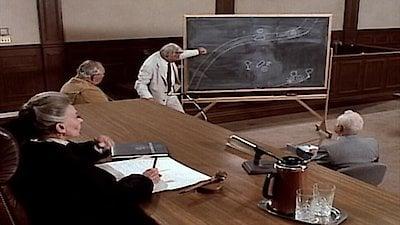In the pantheon of legal dramas, few have achieved the enduring acclaim of “Matlock,” a series that has consistently captivated audiences with its compelling courtroom narratives and astute character portrayals. Episode 6 stands as a quintessential example of the show’s prowess, showcasing a masterclass in courtroom brilliance that both enthralls and educates. This episode not only highlights the titular character, Ben Matlock, as a paragon of legal acumen but also underscores the intricate interplay of strategy, ethics, and human emotion that defines the judicial process. Through a meticulous dissection of this episode, we delve into the narrative techniques and legal intricacies that elevate “Matlock” beyond mere entertainment, offering viewers a profound insight into the art of legal advocacy.
Masterful Cross-Examination Techniques in Matlock Episode 6
In episode 6 of “Matlock,” the courtroom scenes showcase an array of cross-examination techniques that highlight the brilliance of the titular character. Ben Matlock, portrayed with unmatched finesse, employs a strategic blend of psychological insight and meticulous attention to detail to unravel the truth. His approach is not merely about discrediting witnesses but about subtly guiding them to reveal inconsistencies in their testimonies. This episode stands out for its demonstration of how an attorney can use the power of silence, allowing the tension in the courtroom to build, prompting witnesses to fill the void with revealing admissions.
- Leading Questions: Matlock artfully crafts questions that lead witnesses to inadvertently confirm his narrative.
- Emotional Appeal: He connects with the jury by humanizing his client and subtly shifting their sympathies.
- Logical Deductions: Through a series of logical deductions, Matlock systematically dismantles the prosecution’s case.
These techniques, combined with his charismatic courtroom presence, create a compelling narrative that not only entertains but educates viewers on the art of cross-examination. This episode serves as a masterclass in how an attorney can wield both words and silence as powerful tools in the pursuit of justice.

Strategic Use of Evidence and Witness Testimonies
In episode 6 of “Matlock,” the courtroom scenes exemplify a masterclass in the strategic deployment of evidence and witness testimonies. Matlock’s approach to presenting evidence is not merely about showcasing facts; it’s about weaving a narrative that captivates the jury and underscores the defendant’s innocence. By carefully selecting which pieces of evidence to highlight, Matlock ensures that each element builds upon the last, creating a cohesive and compelling story. His ability to anticipate the prosecution’s moves and counter them with precise, well-timed evidence demonstrates his deep understanding of legal strategy and psychological insight.
The use of witness testimonies in this episode is equally noteworthy. Matlock meticulously chooses witnesses whose accounts not only support his case but also possess the credibility to sway the jury. His skill in questioning witnesses is evident as he employs a combination of direct examination and cross-examination techniques to reveal inconsistencies in the opposition’s narrative. Key strategies include:
- Establishing rapport with witnesses to elicit honest and favorable testimonies.
- Exposing contradictions in the prosecution’s witnesses through careful questioning.
- Highlighting key witness observations that align with the defense’s storyline.
This strategic orchestration of evidence and testimonies showcases Matlock’s courtroom brilliance, underscoring the importance of a well-planned legal approach in achieving justice.
Analyzing Matlocks Persuasive Closing Arguments
In the climactic moments of episode 6, Matlock’s persuasive closing arguments stand as a testament to his courtroom brilliance. With a meticulous blend of logic and emotion, he crafts a narrative that is both compelling and irrefutable. Matlock’s strategy hinges on a few key elements:
- Emotional Appeal: Matlock masterfully connects with the jury on a human level, drawing them into the emotional undercurrents of the case. His ability to evoke empathy is not just a rhetorical flourish but a calculated move to sway the jury’s perception.
- Logical Structure: The argument unfolds with impeccable logic, each point building upon the last. Matlock ensures that every piece of evidence is woven seamlessly into the narrative, leaving no room for doubt.
- Rhetorical Questions: By posing questions that highlight inconsistencies in the prosecution’s case, Matlock subtly guides the jury to question the reliability of the opposing arguments.
His closing argument is not just a summary of the case but a transformative experience for the jury, reshaping their understanding and leading them towards a verdict. Matlock’s ability to balance emotional resonance with logical precision exemplifies his status as a courtroom virtuoso, leaving a lasting impression that extends beyond the confines of the episode.
Recommendations for Aspiring Lawyers Inspired by Matlock
In episode 6 of “Matlock,” the titular character showcases a blend of legal acumen and charisma that aspiring lawyers can learn from. Developing a keen sense of observation is crucial, as Matlock demonstrates by noticing the smallest details that others overlook. Aspiring lawyers should hone their ability to scrutinize evidence and witness behavior, drawing connections that might not be immediately apparent. Additionally, the art of persuasion is on full display in this episode. Matlock’s ability to weave a compelling narrative in the courtroom underscores the importance of storytelling in legal practice. Crafting a narrative that resonates with the jury can be the difference between winning and losing a case.
- Attention to Detail: Cultivate the habit of examining every piece of evidence thoroughly.
- Effective Communication: Practice clear and persuasive speech to articulate your arguments convincingly.
- Empathy and Understanding: Develop the ability to understand your client’s perspective and the nuances of their case.
Moreover, Matlock’s unwavering confidence serves as a reminder of the importance of self-assurance in the courtroom. Aspiring lawyers should work on building their confidence through preparation and experience, ensuring they can stand firm under pressure. the episode highlights the significance of integrity and ethics in legal practice. Matlock’s commitment to justice, even when the odds are against him, is a powerful lesson for any lawyer aiming to make a meaningful impact in their career.


